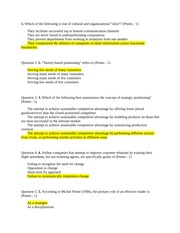Organizational culture includes an organization's expectations, experiences, philosophy, as well as the values that guide member behavior, and is expressed in member self-image, inner workings, interactions with the outside world, and future expectations. Culture is based on shared attitudes, beliefs, customs, and written and unwritten rules22. Which of the following statements is true about ethical corporate cultures? A. Ethical organizational culture cannot have a direct impact on the bottom line. B. If attended to and supported, a strong ethical culture can serve as a deterrent to stakeholder damage. C.There seems to be wide agreement that organizational culture refers to a system of shared meaning held by members that distinguish the organization from other organizations. Organizational culture is a system of shared assumptions, values, and beliefs, which governs how people behave in organizations.Which of the following regarding organizational climate and organizational culture is true? A) Culture creates climates. B) Research on culture is generally quantitative in nature.A learning culture is an organizational culture in which all but one of the following is true. Name the exception:Learning is rewarded, guaranteed and supported by managers and organizational objectivesManagers are recognized as the source of...
Which of the following is true about corporate culture A
Which statement about the external environment and employment is true? Sony Corporation's focus on product innovation is an example of which of the following dimensions of organizational culture. An organization with a strong culture would need fewer written rules and regulations to conduct business than a weak culture.21 Which of the following statements are true about organizational culture? Check all that apply a. Employees may be unaware of the underlying assumptions that guide an organization's culture. b. Culture can create a competitive advantage for a company. c. A company's culture cannot be taught-managers must hire people that have the right culture. […]21 Which of the following statements are true about organizational culture? Check all that apply. a. Employees may be unaware of the underlying assumptions that guide an organization's culture. b. Culture can create a competitive advantage for a company. c. A company's culture cannot be taught-managers must hire people that have the rightOrganizational culture is the set of shared values, beliefs, and norms that influence the way employees think, feel, and behave towards each other and towards people outside of the organization.

Organizational Culture: Definition, Characteristics, Roles
Which of the following statements are true about organizational culture? Check all that applya. Employees may be unaware of the underlying assumptions that guide an organization's culture.b. Culture can create a competitive advantage for a company.c. A company's culture cannot be taught-managers must hire people that have the right culture.d.All of the following are elements of Ott's notion of organizational culture EXCEPT for _____. A) organizational culture is made up of such things as values, beliefs, assumptions, perceptions, behavioral norms, artifacts, and patterns of behavior B) organizational culture has a process of formally approving or prohibiting behaviors C) organizational culture is a socially constructed, unseen2. Which of the following is NOT true about organizational culture? A. refers to the unique set of values of an organization B. shapes the degree of cooperation and competition within the organization C. governs the way employees interact with each other D. workers who don't conform to their organization's culture are rewarded Workers who don't conform to their organization's culture areWhich of the following is true about corporate culture? A. Corporate cultures shape the people of the organization, without getting affected by them. B. Corporate cultures are generally static, but can be changed by voluntary action of the top managers. C. Corporate cultures can hinder individuals in making the "right" decisions. D.21 Which of the following statements are true about organizational culture? Check all that apply a. Employees may be unaware of the underlying assumptions that guide an organization's culture. b. Culture can create a competitive advantage for a company. c. A company's culture cannot be taught-managers must hire people that have the right
Which of the following is true about organizational culture?
The power of an organization's culture refers to how widely and deeply employees hang the company's dominant values and assumptions. The existence span of robust organizational cultures is nearly always brief. It is recommended that businesses with sturdy cultures have a tendency to be more successful, irrespective of any prerequisites. Most staff across all sub-units understand the dominant values but make a selection to ignore them. Companies have robust cultures when the dominant values are held mainly by a couple of people at the most sensible of the group.
Understanding Organizational Cultures

MGT 313.pdf - Which of the following is true of ...

The Field Research Process Lacks Which Of Following ...

Learn SEO: The Ultimate Guide For SEO Beginners [2020 ...

In the context of the types of corporate culture which of ...

Solved: Which Of The Following Ideas Is Closely Linked To ...
Quiz 4 - 1 Which of the following is true of cultural and ...

Which of the following is NOT true about organizational ...

Week4 Quiz - 1 Which of the following is true of cultural ...

bus 303 week 1 quiz.docx - Question 1 0 0.6 pts Which of ...

Which of the following statements is true about ...

Which of the following is the key benefit of effective ...

Which of the following statements is true about ...

Learn SEO: The Ultimate Guide For SEO Beginners [2020 ...

1 1 pts Question 10 Which of the following statements is ...

Quiz 4 - 1 Which of the following is true of cultural and ...

compined Graded 3.pdf - Question 1 There are three central ...

Solved: Styles In The Context Of Different Cultures Strugg ...
Which of the following statements is true about ...

From personnel management to hrm. (PDF) Personnel ...

Learn SEO: The Ultimate Guide For SEO Beginners [2020 ...

0 comments:
Post a Comment